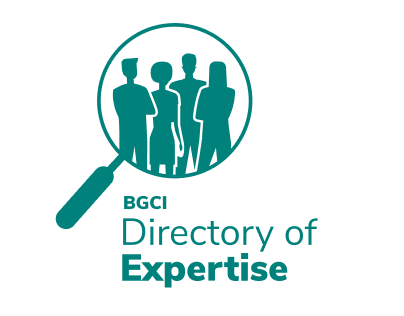Equality, Diversity, and Inclusion Policy
- Anti Bribery and Corruption Policy
- ISO 3166
- Anti Harassment and Bullying Policy
- Anti Money Laundering Policy
- Code of Conduct
- Dignity at Work
- Equality, Diversity, and Inclusion Policy
- Privacy Policy
- Safeguarding Children, Young Persons, and Vulnerable Adults Policy
- Whistleblowing
Our Commitment
Botanic Gardens Conservation International is committed to encouraging equality, diversity and inclusion among our workforce, and eliminating unlawful discrimination. The aim is for our workforce to be truly representative of all sections of society and our customers, work in an environment free from harassment and bullying, and for each employee to be treated with dignity and respect. We have separate anti-harassment and bullying and dignity at work policies, which deal with these issues.
The Law
It is unlawful to discriminate directly or indirectly in recruitment or employment because of a ‘protected characteristic’. The Equality Act defines the protected characteristics as being age, disability, sex, gender reassignment, pregnancy, maternity, race (which includes colour, nationality, caste and ethnic or national origins), sexual orientation, religion or belief, or because someone is married or in a civil partnership.
Discrimination after employment may also be unlawful, e.g. refusing to give a reference for a reason related to one of the protected characteristics.
It is also unlawful to discriminate against or harass a member of the public or service user in the provision of services or goods or to fail to make reasonable adjustments to overcome barriers to using services caused by disability.
The duty to make reasonable adjustments includes the removal, adaptation or alteration of physical features, if the physical features make it impossible or unreasonably difficult for disabled people to make use of services. In addition, service providers have an obligation to think ahead and address any barriers that may impede disabled people from accessing a service.
Types of Unlawful Discrimination
- Direct discrimination is where a person is treated less favourably than another because of a protected characteristic. However, discrimination may be lawful if there is an occupational requirement which is core to a job role and a proportionate means of achieving a legitimate aim.
- Indirect discrimination means putting in place, a rule or policy or way of doing things that has a worse impact on someone with a protected characteristic than someone without one, when this cannot be objectively justified.
- Harassment is where there is unwanted behaviour related to a protected characteristic (other than marriage and civil partnership, and pregnancy and maternity) which has the purpose or effect of violating someone’s dignity or which creates a hostile, degrading, humiliating or offensive environment. It does not matter whether or not this effect was intended by the person responsible for the conduct.
- Associative discrimination is where the individual treated less favourably does not have a protected characteristic but is discriminated against because of their association with someone who does e.g. the parent of a disabled child.
- Perceptive discrimination is where the individual discriminated against or harassed does not have a protected characteristic but they are perceived to have a protected characteristic.
- Third-party harassment occurs where an employee is harassed by third parties such as service users, due to a protected characteristic.
- Victimisation is treating someone unfavourably because they have taken some form of action relating to the Equality Act i.e. because they have supported a complaint or raised a grievance under the Equality Act 2010, or because they are suspected of doing so. However, an employee is not protected from victimisation if they acted maliciously or made or supported an untrue complaint.
- Failure to make reasonable adjustments is where a rule or policy or way of doing things has a worse impact on someone with a protected characteristic compared with someone who does not have that protected characteristic and the employer has failed to make reasonable adjustments to enable the disabled person to overcome the disadvantage.
Equal Opportunities in Employment
We will avoid unlawful discrimination in all aspects of employment including recruitment, promotion, opportunities for training, pay and benefits, discipline and selection for redundancy. Job descriptions will avoid any unnecessary requirements (those unrelated to effective performance) that may otherwise have deterred applicants. We will base decisions on objective criteria. We will consider making reasonable adjustments in recruitment as well as in day-to-day employment.
Service Users, Suppliers and Others
BGCI will not discriminate unlawfully against service users using or seeking to use the services we provide. If you are bullied or harassed by a service user, suppliers, contractor, visitor or others, or if you witness someone else being bullied of harassed, you are asked to report this to your manager who will take appropriate action (see anti-harassment & bullying policy).
Training
We will provide training to all employees about their rights and responsibilities under the equality, diversity and inclusion policy. Responsibilities include staff conducting themselves to help the organisation provide equal opportunities in employment, and prevent bullying, harassment, victimisation and unlawful discrimination.
We will make opportunities for training, development and progress available to all staff, who will be helped and encouraged to develop their full potential, so their talents and resources can be fully utilised to maximise the efficiency of the organisation.
Your Responsibilities
All staff are responsible to support the organisation to meet its commitment and avoid unlawful discrimination. If you believe that you have been discriminated against, you should report this to your line manager or the Secretary General under the grievance procedure. If your complaint involves bullying or harassment, the grievance procedure is modified as set out in the anti-harassment and bullying policy. We take any complaint seriously and you will not be penalised for raising a grievance, even if your grievance is not upheld, unless your complaint is both untrue and made in bad faith.
If you witness what you believe to be discrimination you should report this to your line manager or the Secretary General as soon as possible.
Employees can be held personally liable as well as, or instead of, the organisation for any act of unlawful discrimination. Employees who commit serious acts of harassment may be guilty of a criminal offence. Acts of discrimination, harassment, bullying or victimisation against employees or customers are disciplinary offences and will be dealt with under our disciplinary procedure. Discrimination, harassment, bullying or victimisation may constitute gross misconduct and could lead to dismissal without notice.
Monitoring and Review
We will monitor the make-up of the workforce regarding information such as age, sex, ethnic background, sexual orientation, religion or belief, and disability in encouraging equality, diversity and inclusion, and in meeting the aims and commitments set out in the equality, diversity and inclusion policy.
Monitoring will also include assessing how the equality, diversity and inclusion policy, and any supporting action plan, are working in practice. We will review this policy periodically, reporting to the Board of Trustees on any actions or activities undertaken.
Any information provided by job applicants and employees for monitoring purposes will be used only for these purposes and will be dealt with in accordance with the Data Protection legislation.
Share
Become a Member
Be part of the largest network of botanic gardens and plant conservation experts in the world by joining BGCI today!
BGCI Member Announcement
Are you a BGCI Member? Do you have a news announcement, event, or job posting that you would like to advertise? Complete the form at the link below!





